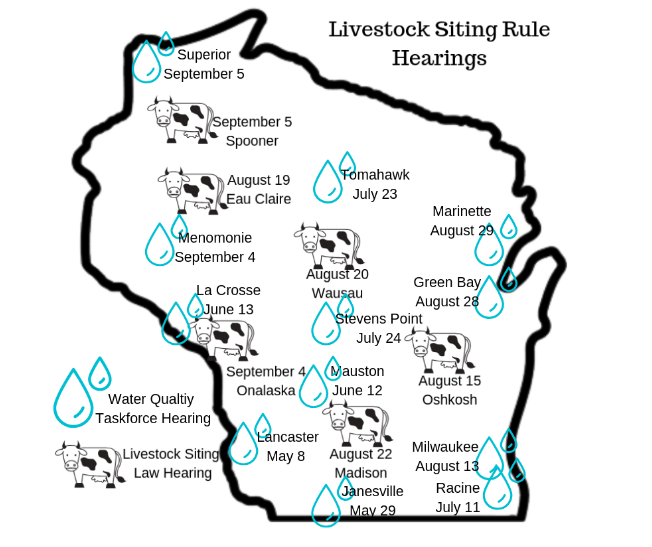
Last week wrapped up the public hearings for both the proposed revisions to the Livestock Siting Rule, and the Speaker’s Water Quality Task Force. In total, there were 19 hearings this summer, giving us 19 opportunities to speak up for clean water! A lot was covered in both hearings, the proposed livestock siting rule changes helping change how CAFO’s (concentrated animal feeding operations otherwise known as factory farms) are regulated, and the Water Quality Task Force travelling the entire state listening to citizen concerns about clean water issues.
The Department of Agriculture, Trade and Consumer Protection (DATCP) held six of the 19 hearings across the state to discuss the revisions and listen to public feedback. Each hearing included two sessions, one in the afternoon and one during the evening. This format expanded the opportunity for those working traditional hours to attend, and we cannot emphasize how important this format is for holding public hearings! Thank you to DATCP for making these hearings more accessible to the public and allowing more voices to be heard.
Personal testimonies shine a strong light on how everyday people are impacted by policies such as the Livestock Siting Rule. KW, who attended one of the Madison sessions, spoke publicly about her personal experience with CAFOs:
“Living in Springfield Corners near a disgusting factory farm for cows, I spoke about the importance of protecting clean water and air. The smells from animal manure permeate our home. We often can’t open windows. I shared this and my experience driving past the farm with cows squished together in absolutely inhumane conditions. It made me cry.”
Another attendee shared during a hearing session in Onalaska:
“There was an alarming headline a few weeks back – Wisconsin leads the nation in family farm bankruptcies. There are many reasons for this, but one is that those farm families who have made Wisconsin what it is cannot compete with the confinement agriculture that we are talking about today.”
The Water Quality Task Force held the other 13 hearings this summer. Water should be a fundamental right in Wisconsin, and we turned out to make sure our legislators heard that message. From discussing lead pipes throughout the state to coal piles that not only decrease water quality but also air quality in surrounding communities, Wisconsinites have been present and vocal.
Sierra Club Wisconsin members were present at each water quality hearing. Over 100 concerned Wisconsinites attended on behalf of the Sierra Club!
We pushed for the task force to take deliberate actions about lead and other water issues. More than 6% of Wisconsin children have high lead levels, which can lead to mental and physical development for children under the age of 6. In response, we asked the task force to restore Governor’s Ever’s funding of $40 million dollars to replace lead pipes and to repeal the funding limits on SB 48, legislation that would achieve this.
We also expressed the negative impacts of every part of coal powered plants. Coal powered plants throughout Wisconsin use water for the cooling process, harming the aquatic ecosystem when it is returned at a warmer temperature. Coal also travels by train and its dust blows into nearby communities and contributes to increased cases of asthma and respiratory problems. The burning of coal in Wisconsin is also the primary source of mercury in our lakes and rivers – that accumulates in our food chain and makes fish unsafe to eat.
Everyone deserves clean water — from our communities to our environment. Thank you for the constituents who joined us at the task force hearings! Your presence helped protect clean water for all in Wisconsin!
It isn’t too late to make your voice heard! Although the public hearings have concluded for the Livestock Siting Rule revisions, written comments will be accepted through Friday, September 13th. We strongly encourage you to raise your voice to advocate for more robust CAFO regulations. Not quite sure where to start? We’ve got you covered! To learn more about the revisions and share the Sierra Club’s comments, follow this link: https://tinyurl.com/SitingRuleComments. Comments submitted through this form will automatically be routed to decision makers.
Written by Sarah Kear and Sarah Cameron, Project Aides for the Sierra Club John Muir Chapter.